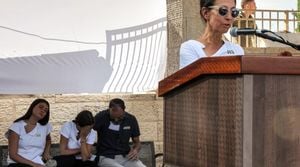President Gustavo Petro made headlines during his recent visit to El Espinal, Tolima, where he boldly touched on the subject of his potential re-election. This visit coincided with the signing of the Pacto por la Tierra y la Vida, marking what he described as un nuevo comienzo (a new beginning) for Colombia.
While addressing supporters, Petro stated, "The issue is not whether I am re-elected or not; the important thing is to re-elect the project. We must re-elect the program, and we will do more, and more, and more. This is just the beginning, and this is the new beginning for the Colombian homeland, hopefully, for Latin America and the Caribbean as well – it is the start of real, vibrant, multicolored democracy." His words echoed through the gathering, reflecting his ambitions for continued political influence.
Petro reiterated his conviction, saying, "If this project continues, the Colombians will have the strong and powerful country they have always deserved for generations. It is the beginning of a justice with ourselves, which we deserve, with our grandparents, our parents, and those who have fallen, bloodied in this land for love, because we are powerful and we have resisted." The president's remarks reaffirmed his belief in the direction of his policies and the changes he aims to bring about.
The atmosphere of the event was notable not just for the political declarations made by Petro but also for the subtle tensions evident between him and Tolima’s governor, Adriana Magali Matiz. At the start of his speech, he expressed disappointment over not being able to greet Matiz, implying her absence was self-imposed, stating, "I could not greet the governor of Tolima because, in my opinion, she did not want to be present here." This public remark underscored the growing rift between the two, particularly as Matiz has been vocal about her criticisms of Petro's security policies and the perceived lack of investment and projects within the region.
This friction is indicative of wider discussions taking place within Colombian politics, as officials navigate the balance between local governance and national leadership under Petro's regime. During his time as president, Petro has sought to pursue more progressive policies, yet he faces challenges from political allies and opponents alike.
The signing of the Pacto por la Tierra y la Vida is anticipated to address various geographical and social issues facing the region, aligning with Petro's strategy to deeply root his policies within Colombian communities. By framing this pact as part of his broader political agenda, he aims to solidify grassroots support and encourage increased participation from local leaders.
Just over one year remains until the election for the presidency, and Petro's comments suggest he is positioning not only himself but also the overarching goals of his administration as central to the future of Colombia. The challenge before him includes uniting various factions within the country, reflecting on their critiques, and proving his commitments resonate with the electorate, especially amid fluctuative public opinion.
While reelection discussions may seem premature, they serve to spotlight the transforming dynamics within Colombia's political sphere. The question of who can truly represent the diverse interests of Colombians is more prominent than ever as people reflect on issues of inequality, justice, and governance.
Petro's visit to Tolima marks another step on his political path, which he hopes will reshape Colombia's future. Whether this will result in re-election remains to be seen, but his strategy points to persisting on his current course.



